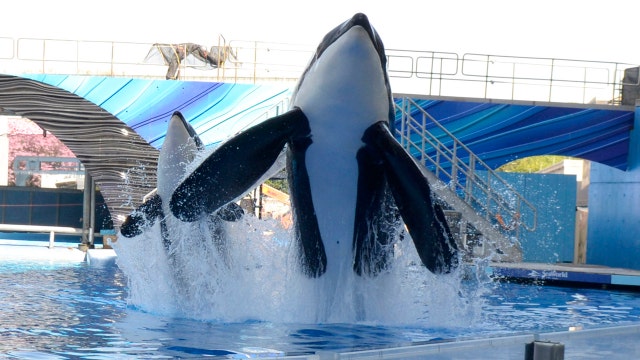Park officials at SeaWorld Orlando were devastated by the sudden death of a 30-year-old orca named Kayla — one of the last remaining orcas at the facility — on Monday.
The orca became ill on Saturday and her health continued to plummet throughout the weekend.
“Her veterinarians immediately began treatment based on a physical examination," SeaWorld explained in a news release. "Although animal care specialists and veterinarians devoted around the clock attention to Kayla, she did not survive."
HUMPBACK WHALES LUNGE TOWARD CALIFORNIA BOAT IN SHOCKING VIDEO
The Orlando park said Kayla "inspired generations of guests and employees to care and learn" about the species, adding that employees were "deeply saddened" by the loss.
Dr. Naomi Rose, a marine-mammal scientist at the Animal Welfare Institute, described the whale's death as unusual.
“That’s like literally being a 30-year-old woman. Dying at 30 is not normal,” Rose told the Orlando Sentinel, adding that "30 is prime of life" for orcas and they typically live to at least 50.
“That’s like literally being a 30-year-old woman. Dying at 30 is not normal."
It remains unclear exactly what caused Kayla's sudden sickness. A cause of death won't be known until a post-mortem examination is conducted, SeaWorld said.
The company announced in 2016 that it had stopped its orca breeding program after years of protests by animal rights activists.
SeaWorld has 20 orcas left at its parks. There are five in Orlando, five in San Antonio and 10 in San Diego. Born in 1988 at SeaWorld San Antonio, Kayla is the second-oldest orca ever born in captivity, according to WTSP.
SPERM WHALE SWALLOWS 64 POUNDS OF TRASH, DIES OF 'GASTRIC SHOCK'
The animal rights group PETA said its members in Florida planned to hold two protests this week outside SeaWorld's Orlando park to memorialize Kayla.
"While we recognize that it's too late to help her, it's not too late to call attention to SeaWorld's other orca prisoners, who must be released into seaside sanctuaries as soon as possible," PETA said in a statement.
The Associated Press contributed to this report.









































